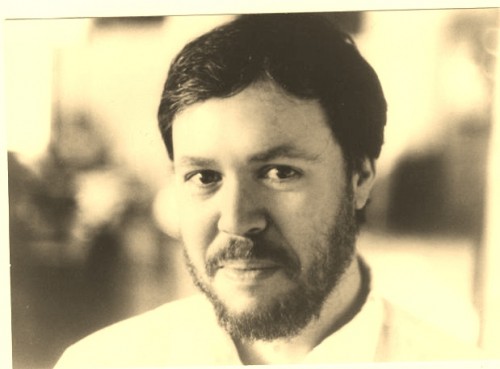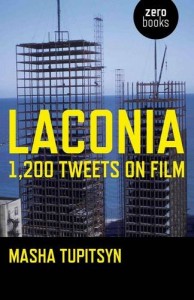Werewolves and White Men: A Conversation with Filmmaker Nick Verdi
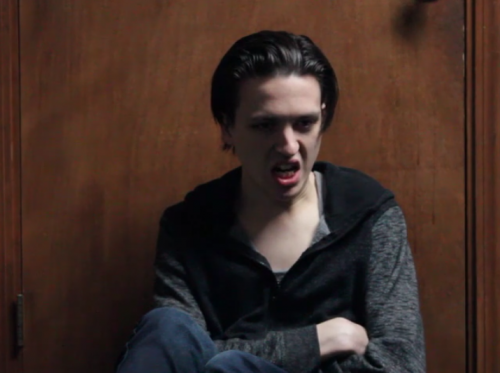
Nick Verdi’s films are ragged. Staggeringly no budget but brimming with hideous feeling, each feels like a dry infection. As informed by the work of Jem Cohen and Kelly Reichardt as they are straight-to-video schlock, Verdi’s films function as direct lines into his fascinations: the ease with which communication breaks down; the violence inflicted by (and upon) the young; a creeping sense of apocalypse that no one else seems to notice.
Last year Nick asked me to perform in his latest short film, Angel of the Night, centering around a 35-year-old university employee whose only sincere interactions are when he’s harassing the student body. During a pre-production workshop, Verdi showed me videos of Sam Hyde, John Maus and werewolves for reference. “We’re such strange creatures, aren’t we?” he said. “White men, I mean.”
Nick Verdi: There’s this one movie Moon of the Wolf. It’s such a middle of the road, ABC movie-of-the-week from 1972. It’s a murder mystery set in Louisiana swamp land, and there’s this rich family that owns the town who lives on this giant plantation. And of course, the head of the family—this guy Andrew Rodanthe—ends up being a werewolf. He’s killing people. He kills this girl Ellie—this poor girl. “Why would this poor girl know Andrew Rodanthe—this rich white guy who owns the town?” And it’s because they were lovers and all this shit, you know. But Andrew Rodanthe is like the perfect “unreflective, refusing to reflect, emotionally detached white guy” that has spent all day completely pent up and in hell, and at night it all comes out and he does awful things, the worst fucking things because the more he doesn’t look at himself the worse it is.
And it’d always been, the explanation for the werewolfism in the movie is the sister character— who’s Barbara Rush—talking about Granddaddy. “Granddaddy always had these spells upstairs.” Then years later she realizes it was because he was drinking. And then Andrew is having these same spells. And it’s like, that’s the thing right there. The drinking is the werewolfism. You think about having some blocked memory of seeing your drunk father. The transformation. You know what I mean? It’s the eeriness, the uncanniness of the home being the safe place, but also where the most fucked up things happen. And this sense of: it’s the man with the button down shirt that is the worst thing you know. It’s all these strange, strange things I feel. It’s the main thing I always think about, you know what I mean?
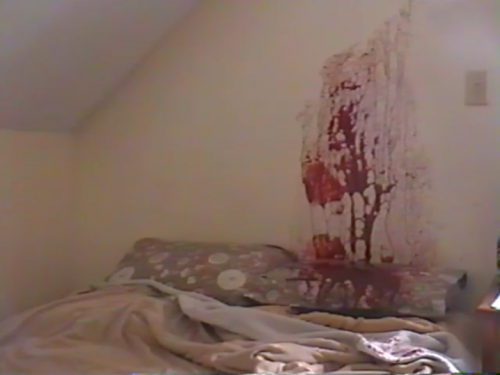
B.R. Yeager: You’ve said that’s one of the things that draws you to John Maus—the way he looks like he’s about to burst out of a tight button down shirt.
NV: Exactly. It’s like I want to see the truth come out in the most violent eruption at whatever expense. The limit of this—this physical body, this form. You come against the limit of your body, and you realize you are not your body. What are you? You know, all this stuff. It’s a tornado inside this person, like what the fuck is going on inside this person, you know?
BRY: You’re talking about wanting the truth to come out, even when (or especially when) the truth is monstrous. Like letting the monstrosity out to be acknowledged. Even though that might be objectively better than holding it in, it’s still terrifying, and maybe confirming things you wish weren’t true.
NV: No, totally—like, the core is a refusal to accept truth. The more you refuse it, the worse it comes back.
BRY: Right.
NV: So it’s always like the refusal to actually self-reflect on whatever—on what you are, on who you are and those things. On things you feel and things you think, you know? Where it’s like you simply have an inability or refusal to self-reflect, or deal for whatever reason.
This topic [werewolves]—this sounds like we’re talking about white men. You know what I mean? This sounds very much like we’re talking about white men right now—the refusal to accept truth, the refusal to accept the truth in yourself. The refusal to accept.
BRY: Which only makes you more monstrous. By hiding it. Because you think that hiding your monstrous aspects will keep you from being a monster. When it’s the opposite. If you don’t figure out how to self-reflect and acknowledge the shitty parts inside you, like address that stuff, the monstrous stuff just bursts out.

NV: Right. Right. Yeah. The other attributes between werewolves and white men is this sense of … you know the Universal The Wolf Man, the Lawrence Talbot character? It’s this shameful, tortured existence. You know what I mean? Like hiding his crying all the time. And that kind of weird sense of faking it through the day but you’re nothing inside. You know? You’re absolutely nothing. And then at night that nothing completely overcomes you. In a simple sense it’s like when someone goes home and gets hammered, and the only way they get any sense of release is through getting hammered and being the worst, as opposed to having some sort of cathartic love of yourself, like selflove being the impossible thing for guys to do. It’s like you’re pretending forever that you’re still doing the 14-year-old dude thing where it’s like “whatever,” when you really have to let that go.
So really I think that tension comes from the refusal of reality, and reality continuously hitting you in the face. And with the werewolf, the tension gets to the point that the fight back is just an absolute nightmare and you succumb to it.
Watch Nick Verdi’s films on Vimeo
Angel of the Night will be released in late September on nobudge.com
August 26th, 2020 / 12:53 pm
Valerie and Her Week of Wonders (reviewing films released some time ago)
Swallowing pearls, drinking chicken’s blood, fighting off creepy clergymen: these are among the many bizarre challenges our protagonist must endure in Valerie and Her Week of Wonders (Dir. Jaromil Jireš, 1970). Valerie, played by the beautiful Jaroslava Schallerova, is a 13 year old girl living with her grandmother in a small town where religion is paramount and old-time ideals are treasured. She spends her days practicing piano, attending church services, and having tea with her grandmother: all things seemingly ordinary for an obedient child. But beneath the pretty surface there is something rotten about this rustic Czechoslovakian hamlet. Vampires! Lecherous priests! Debauching actors in animal masks! And witch-hunting townspeople!
DAVID LYNCH’S DESTABILISING AFFECT
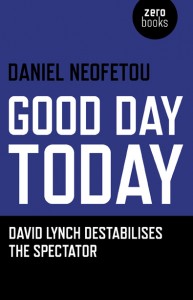 GOOD DAY TODAY: David Lynch Destabilises the Spectator
GOOD DAY TODAY: David Lynch Destabilises the Spectator
By Daniel Neofetou
Zero Books, 2012
93 Pages, $14.95 (buy it at Amazon)
The initial conceit of Neofetou’s Good Day Today is one that I inherently agree with, and one that I think should be considered in larger terms of not only film studies, but an understanding of how to watch movies in general. As a theoretical construct it was first introduced to me in Cinema and Sensation: French Film and the Art of Transgression by Martine Beugnet, a brilliant study of affect found in the mileu of the “new french extremity,” the art house mavericks Bruno Dumont, Philippe Grandrieux, Catherine Breillet, and so on. While Beugnet’s book does lose itself to a final chapter devoted to a Deleuzean study of film & embodiment that, in my opinion, adds nothing to the first two-thirds of the study, overall the book presents and articulates, with careful, pointed examples, what cinema can do for the spectator.
Neofetou’s book, while seemingly not indebted to Beugnet’s book at all (something that I would argue is, in a sense, unfortunate) takes certain theories that have formerly been applied only to experimental (non-narrative) cinema, and looks at David Lynch’s films within this context. His thesis is that these modes of cinema, particularly within the diegetic sway of a narrative & representational film, serve to–as the title would suggest– destabilise, disorient the spectator, the viewer of the film. As such, the book offers a very close reading of a number of Lynch’s films–though the titles of note are, of course, Inland Empire, Lost Highway & Mulholland Drive–& the scenes therein, showing the reader just exactly how Lynch manages to simultaneously play with affect while still insisting upon the “rules” of narrative/figurative/”realist” cinema to the point where when the rules are broken, we are destabilised not because said scene doesn’t make “sense,” but because the scene violates the inherent logic of the film & undermines the authority of an omniscient narrative position.
And the book does this well. Neofetou, throughout the book, takes examples from a number of canonical experimental films (Meshes of the Afternoon, Flaming Creatures, Gidal’s Epilogue) and compares their techniques to the techniques of certain scenes found in Lynch’s films, highlighting both the similarities between the scenes & the differences that arise out of the context of the films as a whole. There’s also a brilliant chapter near the end of the book dedicated to the idea of Lynch’s use of pop-music, absent dialog, and sound, that is a great chapter in its own capacity in looking at the way audio works toward the viewer in a cinematic exegesis.
Another strong point of the book is that within his examination of Lynch as a filmmaker who works with affect more than representation, Neofetou does an excellent job of both rejecting and explaining this rejection of the idea that Lynch’s films are “puzzles” to be solved–closed films where there is a literal solution. This, of course, is ridiculous, and a repeated mode of viewing that I personally find insufferable because, as Neofetou points out that Sontag mentions in her essay Against Interpretation, this mode of viewing “blinds [the spectator] to the work’s sensual facets”.
The book is not perfect, however, and there are two major faults that certainly don’t kill the book, but strike me as perhaps frustrating. The first being a short 7 page look at Lynch’s films through the eyes of the ‘Bechdel Test,’ ultimately considering accusations of Lynch’s films as misogynistic. Unfortunately the chapter ends up sounding apologetic instead of actually engaging with the idea, as its idea loses itself in a self-aware politically correct feedback loop that undermines any sort of look, thus rendering the chapter as blank space in terms of critical thought. I’m curious as to its place in the book, as there are repeated comments regarding Lynch’s ostensible a-political stance.
Which, in a way, leads to my other complaints–the subtitle of the book, the copy on the back, leads one to believe that after introducing (& proving) the idea that Lynch destabilises the spectator, there is little suggested beyond this in the text itself. There are a lot of directions that this could be taken, and the copy suggests that the book will take this idea in the direction that it helps to shake the politically hegemonic mode of representation, which helps to destabilise the idea of binary, simplicity, homogeneity.
April 30th, 2013 / 3:58 pm
Q & A WITH TODD GRIMSON
Todd Grimson is one of the great living cult novelists. I’ve known him for a few years, under strange circumstances. He wrote Brand New Cherry Flavor, which is both one of my favorite horror novels and my favorite novel about Hollywood and the film industry. He also wrote the underground vampire classic Stainless. Both were recently re-released by Schaffner Press, which is now publishing his new collection of stories, Stabs at Happiness, in pleasing hardcover.
It’s a terrific collection, diverse and weird and disturbing. (Here are some reviews: Litbitch. The Oregonian. Gothic.net.) You can and should buy it.
I asked Todd some questions about Stabs at Happiness and about his strange life and career.
For a while, you assumed the name “I. Fontana” and published stories in BOMB, Juked, The Quarterly, Lamination Colony, Word Riot, PANK, the Voice Literary Supplement, Bikini Girl, Spork and many others. We corresponded for some time before I knew your real name. Why did you adopt that name?
Fontana comes from “Fontana Mix,” a composition by John Cage I heard when I was 13. READ MORE >
The Boys from Oz
Australians have a history of distrust with the suburban space. It’s one that I think is far more ingrained than the ongoing American preoccupation with the suburbs. The abjection, otherness, decay and concealed violence of the suburban space, and the affect this space has on the Australian male, is an important part of the Australian imaginary. This is evident with the continuous repetition of these themes, particularly criminality and violence, in a whole host of recent films: Wish You Were Here (2012), Snowtown (2011), Animal Kingdom (2010), Somersault (2004), The Boys (1998) and Head On (1998).
I’ve chosen to talk about The Boys and Animal Kingdom because I think that they offer a distinct and unique portrayal of masculinity: one that is on the borderline, in between the public and private, criminality and legality, contained in an uncanny domestic space. The everyday suburban space is ruptured, undone and exposed as an unsettling site for a stifling and childlike male development, categorised by violence and the need to return to the maternal. This is the common trope in Australian domestic cinema ‘which finds expression in a distorted reflection akin to a hall of mirrors; each person staring back is undoubtedly familiar, but is in some way simultaneously emphasised, concealed and misshapen.’ (Thomas and Gillard, Metro Magazine, 2003)
September 27th, 2012 / 11:19 pm
SLEEPING BEAUTY: A FEW WORDS ON MY FAVORITE MOVIE OF 2011
Sleeping Beauty, the mesmerizing, disquieting first film directed by Australian novelist Julia Leigh, was the most psychologically penetrating work in any medium that I encountered this year. It’s weird how the most impenetrable works can also be the most penetrating.
Leigh seems to get that paradox. “My vagina is not a temple,” says Lucy, assuring her prospective employer that she has no problem with taking sleeping pills and allowing wealthy men access to her nude, unconscious body. “Nevertheless, you will not be penetrated,” the madame promises. READ MORE >
RIP Jean Rollin (1938-2010)
French filmmaker and novelist Jean Rollin — known for his erotic, gothic horror films — passed away on Wednesday. Rollin was an auteur who described his work as “fantastique.” I’m not that big of a fan of 70s Eurosleaze, but I like the films that I’ve seen by Rollin. Above is an untranslated trailer from Night of the Hunted, which is one his “art” films (and one of my fav Rollin films; reminds me a little of Alain Robbe-Grillet).
Three things I’ve watched recently and loved plus one, or, the rational love for immorality
I’ve been watching a lot of television lately. Television off the internet. This is a preferable way to watch television. For one, I don’t have to deal with commercials. Also, I can watch a whole season at a time, and being naturally obsessive, I can’t deal with the suspense of waiting an entire week—much less a whole year for a new season to start—to find out “what happens.” That being said, I have to wait on two shows now, which brings me great displeasure and discomfort.
I’ve seen a few things recently, and I’ve struggled to understand what makes them enjoyable, what compels me to keep on watching. After all, if I weren’t watching television or movies, I could be reading. (Though to be fair to myself, I spend my days trekking through fairly dense geographic texts, so by the evening, I like to relax with my partner and our two cats, “turn off” so to speak, even though I know my time could be spent in a more “productive” manner.)
But even as I’m “turning off” and letting myself get tangled in television or film, I remain critically alert. And in the end, I realize the reason I love watching what I’ve watched is because through these particular shows and films, my morality is challenged and I not only empathize but also desire the success of immoral characters. It is not unlike the experience of reading Crime & Punishment, where the reader rallies for Raskolnikov, even though he is a murderer. We don’t want him to get caught. We want him to be ok. We want the best for him. And in the end, as his consciousness fractures under the weight of his lawfully unpunished crimes, we want him to be physically punished, just to alleviate the psychological punishment.
too cool for tuesday but hell…
Eerie, refreshing. Odd. Watch this:
What did you think?
Watch it it again with Gus and the MCP (Medicine Cabinet People, as you know).
And?

